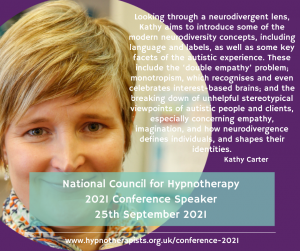 There are around 700,000 autistic people in the UK. Rates of diagnosis in children show that roughly 1 in 88 children are on the autism spectrum and it affects more males than females. Each autistic person will be somewhere on a spectrum, from neurotypical but high functioning professionals through to individuals who struggle to live alone or support themselves.
There are around 700,000 autistic people in the UK. Rates of diagnosis in children show that roughly 1 in 88 children are on the autism spectrum and it affects more males than females. Each autistic person will be somewhere on a spectrum, from neurotypical but high functioning professionals through to individuals who struggle to live alone or support themselves.
Regardless of where on the spectrum an autistic person is, their cognitive and sensory processing differences generally mean that they will struggle with interpersonal communication, social situations and feelings of anxiety and depression.
The National Council for Hypnotherapy (NCH) recognises the diversity of experience that people encounter throughout their lives and actively seek to promote understanding and awareness within their membership body of methods to work effectively with the neurodivergent. There are still many myths and preconceptions about autistic people in the wider community which stop them from receiving effective help.
Hypnotherapy is very effective for helping people overcome anxiety and depression, improve their self-esteem and self-confidence and let go of negative or obsessional thinking. In 2013, Dr Laurence Sugarman outlined a protocol for children on the autism spectrum in the American Journal of Clinical Hypnosis.
The model was based on learning to regulate the autonomic nervous system, calming the fight-or-flight reflex. He also taught social and interpersonal skills. The combined approach of calming and skill building resulted in his patients reporting major changes in how they felt about themselves, their environment and their ability to successfully navigate the world.
Using hypnotherapy can help turn some of the so-called ‘negatives’ of autism and neurodivergence on their heads. An effective therapist will be able to harness their client’s special interests and skills at visualising and focusing to help them understand the world differently rather than trying to teach them ways to change themselves in order to ‘fit in’.
If you or one of your loved ones is autistic and struggling with feelings of anxiety or depression, there’s effective help available. Use the NCH hypnotherapist finder to find someone close to you who can help.
 Want to know more about working with neurodivergent clients? Join us on the 25th of September to hear Kathy Cater speak about ‘Embracing the neurodiversity-affirming hypnotherapist ethos’
Want to know more about working with neurodivergent clients? Join us on the 25th of September to hear Kathy Cater speak about ‘Embracing the neurodiversity-affirming hypnotherapist ethos’
Looking through a neurodivergent lens, Kathy aims to introduce some of the modern neurodiversity concepts, including language and labels, as well as some key facets of the autistic experience. These include the ‘double empathy’ problem; monotropism, which recognises and even celebrates interest-based brains; and the breaking down of unhelpful stereotypical viewpoints of autistic people and clients, especially concerning empathy, imagination, and how neurodivergence defines individuals, and shapes their identities.
Photo by Leah Kelley from Pexels
